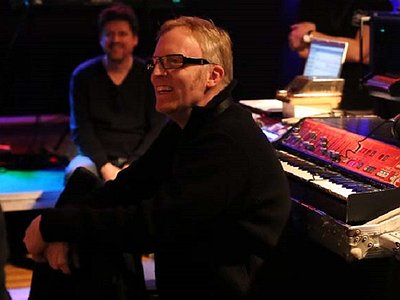Name: Stephen Parsick
Nationality: German
Occupation: Producer, composer
Recent release: Stephen Parsick's arp-en-ciel, released under his ['ramp] alias, is out now. Also still available: ultima ratio, a collaboration with Bernhard Wöstheinrich.
If you enjoyed this interview with Stephen Parsick and would like to stay up to date with his music, visit him on bandcamp.
Some see instruments and equipment as far less important than actual creativity, others feel they go hand in hand. What's your take on that?
Any instrument will never be able to replace creativity as such but, ideally, a musical instrument supports you and inspires you to be creative rather than hinder the creative process.
Of course, the choice of instrument significantly determines the outcome but, after all, an instrument is a means to an end, at least it should be just that in the first place. If it is turned into some kind of cult object, something must have gone wrong along the way.
In the light of picking your tools, how would you describe your views on topics like originality and innovation versus perfection and timelessness in music? Are you interested in a “music of the future” or “continuing a tradition”?
There is a certain arrogance, particularly in the community that produces electronic music in the most general way – it has to be modern, it must not hark back to what went on in the past, it has got to be “original” (whatever that means), and specific styles and genres are pooh-poohed at more than others. Thus the question is, what exactly makes music sound innovative or original?
I, for one, find Techno from the mid-1990s and its stylistic means extremely dated-sounding today (and also back then) even though others claim this to be the be-all and end-all of everything. Likewise, I can't warm up to music that claims to be “modern” or “futuristic”, just for the sake of it. Usually, it would not speak to me and aim way above my head. Most of what is considered to be trailblazing or forward-thinking is nothing but vain drywank to me – I can't help the impression that it's less about the music but more about presenting a specific kind of image to the public: The hipper and the more esoteric, the better. Quite why that is, I can't say.
I don't care for a “music of the future” – in an ideal world, music that has something to convey in terms of emotional or aesthetic value will always exist beyond the boundaries of time. I am not into perfection either – if you really succeeded in creating something that is perfect, what would be the point of going on?
I am more into using sound to conjure up a specific sort of environment or setting of a specific era – whether this is modern, futuristic, forward-thinking or original, I don't care. I just want it to be the sort of music I personally enjoy listening to – which happens to be firmly rooted in some era long gone, so, yes, I guess it's a bit about continuing a tradition, and still coming across some territories that have remained uncharted in some way or other, at least by me.




